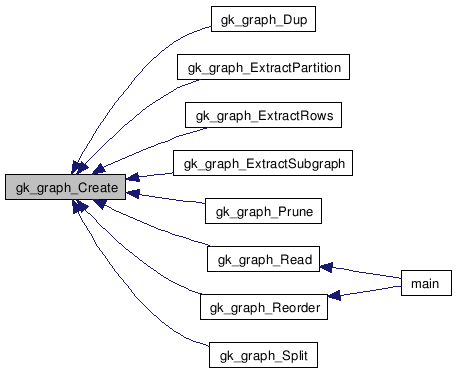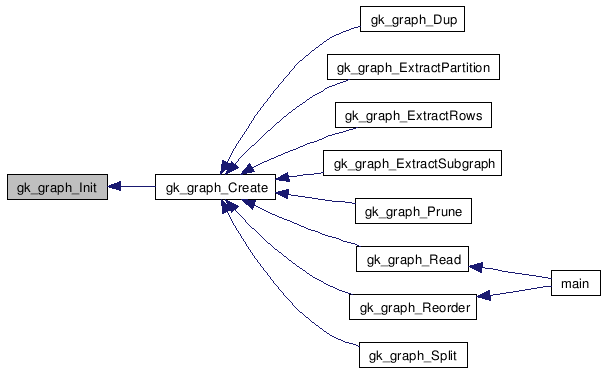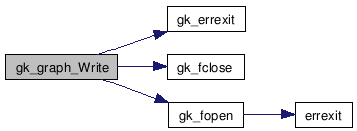

Go to the source code of this file.
$Id: graph.c 13328 2012-12-31 14:57:40Z karypis $
Definition in file graph.c.
| gk_graph_t* gk_graph_Create | ( | ) |
Allocate memory for a graph and initializes it
Definition at line 19 of file graph.c.
References gk_graph_Init(), and gk_malloc().
Referenced by gk_graph_Dup(), gk_graph_ExtractPartition(), gk_graph_ExtractRows(), gk_graph_ExtractSubgraph(), gk_graph_Prune(), gk_graph_Read(), gk_graph_Reorder(), and gk_graph_Split().


| void gk_graph_Init | ( | gk_graph_t * | graph | ) |
Initializes the graph.
Definition at line 36 of file graph.c.
References gk_graph_t::nvtxs.
Referenced by gk_graph_Create().

| void gk_graph_Free | ( | gk_graph_t ** | graph | ) |
Frees all the memory allocated for a graph.
Definition at line 48 of file graph.c.
References gk_free(), and gk_graph_FreeContents().
Referenced by gk_graph_Prune(), and main().


| void gk_graph_FreeContents | ( | gk_graph_t * | graph | ) |
Frees only the memory allocated for the graph's different fields and sets them to NULL.
Definition at line 63 of file graph.c.
References gk_graph_t::adjncy, gk_graph_t::fadjwgt, gk_graph_t::fvsizes, gk_graph_t::fvwgts, gk_free(), gk_graph_t::iadjwgt, gk_graph_t::ivsizes, gk_graph_t::ivwgts, gk_graph_t::vlabels, and gk_graph_t::xadj.
Referenced by gk_graph_Free().


| gk_graph_t* gk_graph_Read | ( | char * | filename, | |
| int | format, | |||
| int | isfewgts, | |||
| int | isfvwgts, | |||
| int | isfvsizes | |||
| ) |
Reads a sparse graph from the supplied file
| filename | is the file that stores the data. | |
| format | is the graph format. The supported values are: GK_GRAPH_FMT_METIS. | |
| isfewgts | is 1 if the edge-weights should be read as floats | |
| isfvwgts | is 1 if the vertex-weights should be read as floats | |
| isfvsizes | is 1 if the vertex-sizes should be read as floats |
Definition at line 85 of file graph.c.
References gk_graph_t::adjncy, gk_graph_t::fadjwgt, float, gk_graph_t::fvsizes, gk_graph_t::fvwgts, gk_errexit(), gk_fclose(), gk_fexists(), gk_fopen(), gk_free(), gk_getline(), gk_graph_Create(), gk_graph_t::iadjwgt, int, int32_t, gk_graph_t::ivsizes, gk_graph_t::ivwgts, PUP::l, ncon, gk_graph_t::nvtxs, and gk_graph_t::xadj.
Referenced by main().


| void gk_graph_Write | ( | gk_graph_t * | graph, | |
| char * | filename, | |||
| int | format | |||
| ) |
Writes a graph into a file.
| graph | is the graph to be written, | |
| filename | is the name of the output file. | |
| format | is one of GK_GRAPH_FMT_METIS specifying the format of the output file. |
Definition at line 277 of file graph.c.
References gk_graph_t::adjncy, gk_graph_t::fadjwgt, gk_graph_t::fvsizes, gk_graph_t::fvwgts, gk_errexit(), gk_fclose(), gk_fopen(), gk_graph_t::iadjwgt, gk_graph_t::ivsizes, gk_graph_t::ivwgts, gk_graph_t::nvtxs, xadj, and gk_graph_t::xadj.
Referenced by main().


| gk_graph_t* gk_graph_Dup | ( | gk_graph_t * | graph | ) |
Returns a copy of a graph.
Definition at line 340 of file graph.c.
References gk_graph_t::adjncy, gk_graph_t::fadjwgt, gk_graph_t::fvsizes, gk_graph_t::fvwgts, gk_graph_Create(), gk_graph_t::iadjwgt, gk_graph_t::ivsizes, gk_graph_t::ivwgts, gk_graph_t::nvtxs, gk_graph_t::vlabels, and gk_graph_t::xadj.

| gk_graph_t* gk_graph_ExtractSubgraph | ( | gk_graph_t * | graph, | |
| int | vstart, | |||
| int | nvtxs | |||
| ) |
Returns a subgraph containing a set of consecutive vertices.
| graph | is the original graph. | |
| vstart | is the starting vertex. | |
| nvtxs | is the number of vertices from vstart to extract. |
Definition at line 391 of file graph.c.
References gk_graph_t::adjncy, gk_graph_t::fadjwgt, gk_graph_t::fvsizes, gk_graph_t::fvwgts, gk_graph_Create(), gk_graph_t::iadjwgt, gk_graph_t::ivsizes, gk_graph_t::ivwgts, gk_graph_t::nvtxs, gk_graph_t::vlabels, and gk_graph_t::xadj.

| gk_graph_t* gk_graph_Reorder | ( | gk_graph_t * | graph, | |
| int32_t * | perm, | |||
| int32_t * | iperm | |||
| ) |
Returns a graph that has been reordered according to the permutation.
| IN] | graph is the graph to be re-ordered. | |
| IN] | perm is the new ordering of the graph's vertices | |
| IN] | iperm is the original ordering of the re-ordered graph's vertices |
Definition at line 460 of file graph.c.
References gk_graph_t::adjncy, adjncy, gk_graph_t::fadjwgt, gk_graph_t::fvsizes, gk_graph_t::fvwgts, gk_free(), gk_graph_Create(), gk_graph_t::iadjwgt, int32_t, gk_graph_t::ivsizes, gk_graph_t::ivwgts, gk_graph_t::nvtxs, PUP::u, gk_graph_t::vlabels, gk_graph_t::xadj, and xadj.
Referenced by main().


| int gk_graph_FindComponents | ( | gk_graph_t * | graph, | |
| int32_t * | cptr, | |||
| int32_t * | cind | |||
| ) |
This function finds the connected components in a graph.
| graph | is the graph structure | |
| cptr | is the ptr structure of the CSR representation of the components. The length of this vector must be graph->nvtxs+1. | |
| cind | is the indices structure of the CSR representation of the components. The length of this vector must be graph->nvtxs. |
Definition at line 572 of file graph.c.
References gk_graph_t::adjncy, adjncy, gk_free(), int32_t, gk_graph_t::nvtxs, gk_graph_t::xadj, and xadj.

| void gk_graph_ComputeBFSOrdering | ( | gk_graph_t * | graph, | |
| int | v, | |||
| int32_t ** | r_perm, | |||
| int32_t ** | r_iperm | |||
| ) |
This function computes a permutation of the vertices based on a breadth-first-traversal. It can be used for re-ordering the graph to reduce its bandwidth for better cache locality. The algorithm used is a simplified version of the method used to find the connected components.
| IN] | graph is the graph structure | |
| IN] | v is the starting vertex of the BFS | |
| OUT] | perm[i] stores the ID of vertex i in the re-ordered graph. | |
| OUT] | iperm[i] stores the ID of the vertex that corresponds to the ith vertex in the re-ordered graph. |
Definition at line 665 of file graph.c.
References gk_graph_t::adjncy, adjncy, gk_free(), int32_t, gk_graph_t::nvtxs, gk_graph_t::xadj, and xadj.
Referenced by main().


| void gk_graph_ComputeBestFOrdering0 | ( | gk_graph_t * | graph, | |
| int | v, | |||
| int | type, | |||
| int32_t ** | r_perm, | |||
| int32_t ** | r_iperm | |||
| ) |
This function computes a permutation of the vertices based on a best-first-traversal. It can be used for re-ordering the graph to reduce its bandwidth for better cache locality.
| IN] | graph is the graph structure. | |
| IN] | v is the starting vertex of the best-first traversal. | |
| IN] | type indicates the criteria to use to measure the 'bestness' of a vertex. | |
| OUT] | perm[i] stores the ID of vertex i in the re-ordered graph. | |
| OUT] | iperm[i] stores the ID of the vertex that corresponds to the ith vertex in the re-ordered graph. |
Definition at line 762 of file graph.c.
References gk_graph_t::adjncy, adjncy, degrees, gk_errexit(), gk_free(), gk_i32pq_t, int32_t, gk_graph_t::nvtxs, Ck::IO::open(), perm, PUP::u, gk_graph_t::xadj, and xadj.

| void gk_graph_ComputeBestFOrdering | ( | gk_graph_t * | graph, | |
| int | v, | |||
| int | type, | |||
| int32_t ** | r_perm, | |||
| int32_t ** | r_iperm | |||
| ) |
This function computes a permutation of the vertices based on a best-first-traversal. It can be used for re-ordering the graph to reduce its bandwidth for better cache locality.
| IN] | graph is the graph structure. | |
| IN] | v is the starting vertex of the best-first traversal. | |
| IN] | type indicates the criteria to use to measure the 'bestness' of a vertex. | |
| OUT] | perm[i] stores the ID of vertex i in the re-ordered graph. | |
| OUT] | iperm[i] stores the ID of the vertex that corresponds to the ith vertex in the re-ordered graph. |
Definition at line 887 of file graph.c.
References gk_graph_t::adjncy, adjncy, degrees, gk_errexit(), gk_free(), gk_i32pq_t, int32_t, level, gk_graph_t::nvtxs, perm, PUP::u, gk_graph_t::xadj, and xadj.
Referenced by main().


| void gk_graph_SingleSourceShortestPaths | ( | gk_graph_t * | graph, | |
| int | v, | |||
| void ** | r_sps | |||
| ) |
This function computes the single-source shortest path lengths from the root node to all the other nodes in the graph. If the graph is not connected then, the sortest part to the vertices in the other components is -1.
| IN] | graph is the graph structure. | |
| IN] | v is the root of the single-source shortest path computations. | |
| IN] | type indicates the criteria to use to measure the 'bestness' of a vertex. | |
| OUT] | sps[i] stores the length of the shortest path from v to vertex i. If no such path exists, then it is -1. Note that the returned array will be either an array of int32_t or an array of floats. The specific type is determined by the existance of non NULL iadjwgt and fadjwgt arrays. If both of these arrays exist, then priority is given to iadjwgt. |
Definition at line 1084 of file graph.c.
References gk_graph_t::adjncy, adjncy, adjwgt, gk_graph_t::fadjwgt, gk_fpq_t, gk_free(), gk_i32pq_t, gk_graph_t::iadjwgt, int32_t, gk_graph_t::nvtxs, PUP::u, gk_graph_t::xadj, and xadj.

| void gk_graph_SortAdjacencies | ( | gk_graph_t * | graph | ) |
Sorts the adjacency lists in increasing vertex order
Definition at line 1196 of file graph.c.
References gk_errexit(), gk_free(), gk_ikvsorti(), n, and nn.

| gk_graph_t* gk_graph_ExtractRows | ( | gk_graph_t * | graph, | |
| int | nrows, | |||
| int * | rind | |||
| ) |
Returns a subgraphrix containing a certain set of rows.
| graph | is the original graphrix. | |
| nrows | is the number of rows to extract. | |
| rind | is the set of row numbers to extract. |
Definition at line 1274 of file graph.c.
References gk_graph_Create().

| gk_graph_t* gk_graph_ExtractPartition | ( | gk_graph_t * | graph, | |
| int * | part, | |||
| int | pid | |||
| ) |
Returns a subgraphrix corresponding to a specified partitioning of rows.
| graph | is the original graphrix. | |
| part | is the partitioning vector of the rows. | |
| pid | is the partition ID that will be extracted. |
Definition at line 1313 of file graph.c.
References gk_graph_Create().

| gk_graph_t** gk_graph_Split | ( | gk_graph_t * | graph, | |
| int * | color | |||
| ) |
Splits the graphrix into multiple sub-graphrices based on the provided color array.
| graph | is the original graphrix. | |
| color | is an array of size equal to the number of non-zeros in the graphrix (row-wise structure). The graphrix is split into as many parts as the number of colors. For meaningfull results, the colors should be numbered consecutively starting from 0. |
Definition at line 1360 of file graph.c.
References gk_graph_Create(), and gk_malloc().

| gk_graph_t* gk_graph_Prune | ( | gk_graph_t * | graph, | |
| int | what, | |||
| int | minf, | |||
| int | maxf | |||
| ) |
Prunes certain rows/columns of the graphrix. The prunning takes place by analyzing the row structure of the graphrix. The prunning takes place by removing rows/columns but it does not affect the numbering of the remaining rows/columns.
| graph | the graphrix to be prunned, | |
| what | indicates if the rows (GK_CSR_ROW) or the columns (GK_CSR_COL) of the graphrix will be prunned, | |
| minf | is the minimum number of rows (columns) that a column (row) must be present in order to be kept, | |
| maxf | is the maximum number of rows (columns) that a column (row) must be present at in order to be kept. |
Definition at line 1428 of file graph.c.
References gk_errexit(), gk_free(), gk_graph_Create(), and gk_graph_Free().

| void gk_graph_Normalize | ( | gk_graph_t * | graph, | |
| int | what, | |||
| int | norm | |||
| ) |
Normalizes the rows/columns of the graphrix to be unit length.
| graph | the graphrix itself, | |
| what | indicates what will be normalized and is obtained by specifying GK_CSR_ROW, GK_CSR_COL, GK_CSR_ROW|GK_CSR_COL. | |
| norm | indicates what norm is to normalize to, 1: 1-norm, 2: 2-norm |
Definition at line 1511 of file graph.c.
References n.
 1.5.5
1.5.5